Related Research Articles
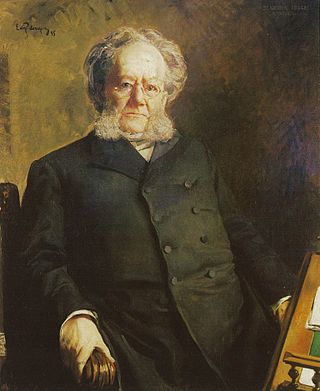
Henrik Johan Ibsen was a Norwegian playwright and theatre director. As one of the founders of modernism in theatre, Ibsen is often referred to as "the father of realism" and one of the most influential playwrights of his time. His major works include Brand, Peer Gynt, An Enemy of the People, Emperor and Galilean, A Doll's House, Hedda Gabler, Ghosts, The Wild Duck, When We Dead Awaken, Rosmersholm, and The Master Builder. Ibsen is the most frequently performed dramatist in the world after Shakespeare, and A Doll's House was the world's most performed play in 2006.

Gustav Vigeland, born as Adolf Gustav Thorsen, was a Norwegian sculptor. Gustav Vigeland occupies a special position among Norwegian sculptors, both in the power of his creative imagination and in his productivity. He is most associated with the Vigeland installation (Vigelandsanlegget) in Frogner Park, Oslo. He was also the designer of the Nobel Peace Prize medal.

Skien is a city and municipality in Vestfold og Telemark county in Norway. In modern times it is regarded as part of the traditional region of Grenland, although historically it belonged to Grenmar/Skiensfjorden, while Grenland referred the Norsjø area and Bø. The administrative centre of the municipality is the city of Skien. Skien is also the capital of Vestfold og Telemark county.

Hedda Gabler is a play written by Norwegian playwright Henrik Ibsen. The world premiere was staged on 31 January 1891 at the Residenztheater in Munich. Ibsen himself was in attendance, although he remained back-stage. The play has been canonized as a masterpiece within the genres of literary realism, nineteenth century theatre, and world drama. Ibsen mainly wrote realistic plays until his forays into modern drama. Hedda Gabler dramatizes the experiences of the title character, Hedda, the daughter of a general, who is trapped in a marriage and a house that she does not want. Overall, the title character for Hedda Gabler is considered one of the great dramatic roles in theater. The year following its publication, the play received negative feedback and reviews. Hedda Gabler has been described as a female variation of Hamlet.
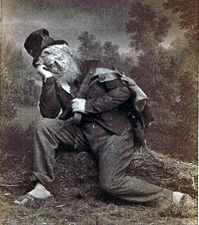
Peer Gynt is a five-act play in verse by the Norwegian dramatist Henrik Ibsen published in 1876. Written in Norwegian, it is one of the most widely performed Norwegian plays. Ibsen believed Per Gynt, the Norwegian fairy tale on which the play is loosely based, to be rooted in fact, and several of the characters are modelled after Ibsen's own family, notably his parents Knud Ibsen and Marichen Altenburg. He was also generally inspired by Peter Christen Asbjørnsen's collection of Norwegian fairy tales, published in 1845.

Ghosts is a play by the Norwegian playwright Henrik Ibsen. It was written in 1881 and first staged in 1882 in Chicago, Illinois, in a production by a Danish company on tour. Like many of Ibsen's plays, Ghosts is a scathing commentary on 19th-century morality. Because of its subject matter, which includes religion, venereal disease, incest, and euthanasia, it immediately generated strong controversy and negative criticism. Since then the play has fared better, and is considered a “great play” that historically holds a position of “immense importance”. Theater critic Maurice Valency wrote in 1963, "From the standpoint of modern tragedy Ghosts strikes off in a new direction.... Regular tragedy dealt mainly with the unhappy consequences of breaking the moral code. Ghosts, on the contrary, deals with the consequences of not breaking it."
"In the Hall of the Mountain King" is a piece of orchestral music composed by Edvard Grieg in 1875 as incidental music for the sixth scene of act 2 in Henrik Ibsen's 1867 play Peer Gynt. It was originally part of Opus 23 but was later extracted as the final piece of Peer Gynt, Suite No. 1, Op. 46. Its easily recognizable theme has helped it attain iconic status in popular culture, where it has been arranged by many artists.
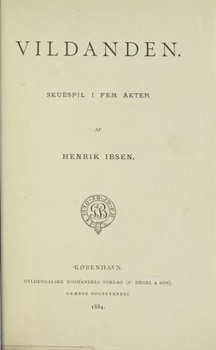
The Wild Duck is an 1884 play by the Norwegian playwright Henrik Ibsen. It is considered the first modern masterpiece in the genre of tragicomedy. The Wild Duck and Rosmersholm are "often to be observed in the critics' estimates vying with each other as rivals for the top place among Ibsen's works."

Terje Vigen is a poem written by Henrik Ibsen, published in 1862. Much of the story and setting is from the area around the town of Grimstad in southern Norway where Ibsen lived for a few years in his youth. It describes the dramatic saga of Terje who, in 1809, tried to run the British blockade of Norway's southern coast in a small rowboat in a desperate attempt to smuggle food from Denmark back to his starving wife and daughter. He was captured and imprisoned on a British prison hulk and released in 1814 after the Napoleonic Wars were over, only to find that his family had died. He became a pilot, and years later rescued an English lord who turned out to be the commander of the ship that had captured him. The denouement, as in most Ibsen works, should be understood by reading the original.
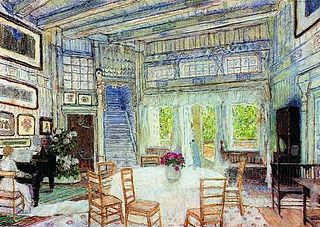
The Lady from the Sea is a play written in 1888 by Norwegian playwright Henrik Ibsen inspired by the ballad Agnete og Havmanden. The drama introduces the character of Hilde Wangel who is again portrayed in Ibsen's later play The Master Builder. The character portrayal of Hilde Wangel has been portrayed twice in contemporary film, most recently in the 2014 film titled A Master Builder.
Catiline or Catilina was Henrik Ibsen's first play. It was written during winter 1848–49 and first performed under Ibsen's name on 3 December 1881 at the Nya Teatern, Stockholm, Sweden. The first performance of Catilina in Norway not under Ibsen's pseudonym was at Det Nye Teater in Oslo on 24 August 1935.

Espen Henrik Skjønberg was a Norwegian actor of stage, screen, and television.

The Ibsen Museum (Ibsenmuseet) occupies the last home of the playwright Henrik Ibsen. It is located close to the Royal Palace on Henrik Ibsens gate in Oslo, Norway. The museum in Oslo is closed. According to the website, it will reopen in 2021.
Norma, or A Politician's Love is an eight-page drama written as an opera parody by Henrik Ibsen. It is influenced by Vincenzo Bellini's opera Norma, which Ibsen saw in 1851, but the characters are contemporary politicians. The play was first printed anonymously in the satirical magazine Andhrimner in 1851. The first book edition came in 1909, and the first performance of the play was at a student theatre in Trondheim 1994.

The International Ibsen Award honours an individual, institution or organization that has brought new artistic dimensions to the world of drama or theater. The committee consists of figures in the theatre community.

MS Henrik Ibsen is a historic Norwegian diesel-powered ship built in 1907. Together with MS Victoria, it sails on the Telemark Canal in Norway between Skien and Dalen in the summer. The ship was built by Eriksbergs Mekaniska Verkstad in Gothenburg, Sweden in 1907 and named SS Styrsö. The ship was operated in the Gothenburg archipelago until 1970, and after that she was used as charter ship.
Nora Bergliot Ibsen is a Norwegian theatrical producer, noted for being the producer of the 2006 Ibsen Year, Norway's major anniversary of playwright Henrik Ibsen's death 100 years earlier, including high profile celebrations in multiple countries. The Ibsen Year was one of the Norwegian government's major cultural undertakings in 2006, aimed at increasing appreciation of Henrik Ibsen and Norwegian culture internationally. The Ibsen Year comprised 8213 separate cultural events, and 83 countries took part in the commemoration.
Theatre of Cruelty is a Norwegian theater company based in Oslo's Hausmania cultural centre. The company produced its first performance in collaboration with Trøndelag Teater in 1989, and was established as an independent group in 1992. The theater has since its establishment been under the management and artistic direction of Lars Øyno. In 2002, the theater company received support from the Norwegian Arts Council to launch its own performing space in Hausmania.
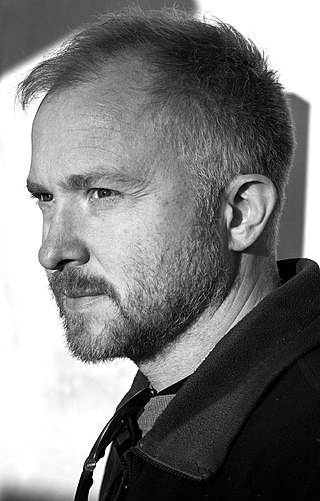
Håkon Anton Fagerås is a Norwegian sculptor. He works within the figurative tradition, and is one of a relatively small set of sculptors working in marble.
Svanhild is an 1860 incomplete prosaic comedy by Norwegian playwright Henrik Ibsen, inspired by themes of Norwegian romantic nationalism, Germanic heroic legend and Norse saga literature. The title of the play suggests that it would be centered around Svanhildr, daughter of the Norse-Germanic mythological figure Sigurd. Ibsen left the work as a draft, and as such it was never officially published in his lifetime. However, an incomplete version of the manuscript was published in 1887 by Ibsen biographer Henrik Jæger as part of an article in Folkebladet.
References
- ↑ "Henrik Ibsens skrifter: Innledning til Fjeldfuglen: tilblivelse". www.ibsen.uio.no. Retrieved 2022-05-31.
- ↑ "IbsenStage". ibsenstage.hf.uio.no. Retrieved 2022-05-31.